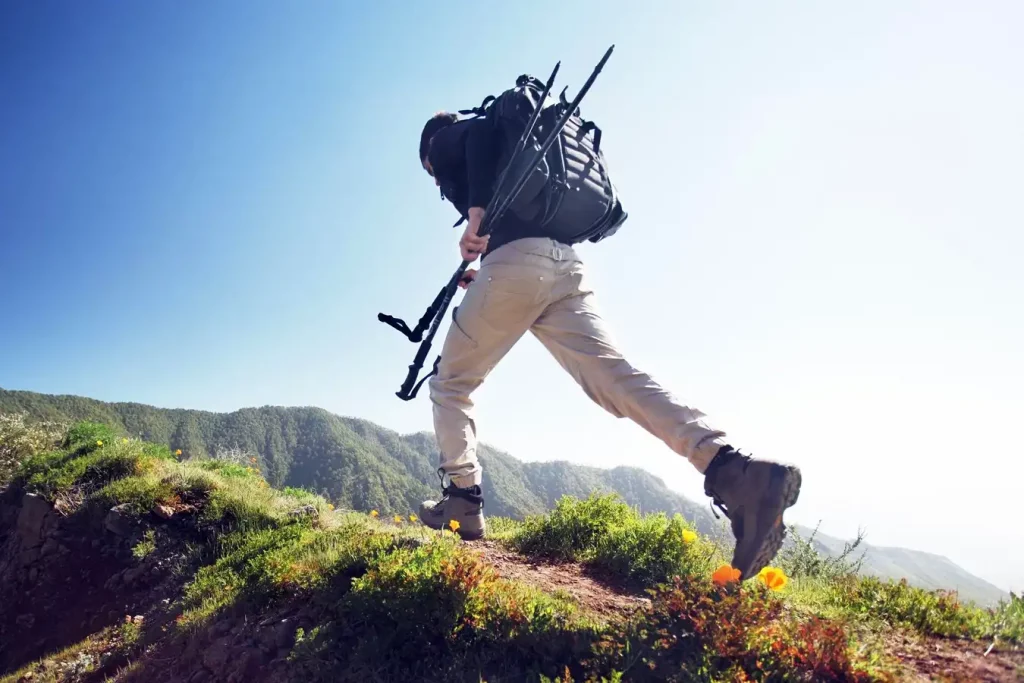Backpacking vs hiking – ever scratched your head over what sets them apart?
It's not just about throwing some gear in a bag; there's an entire world of difference in these two outdoor adventures.
Grab your boots, and let's break it down together so you can hit the trails with confidence, knowing exactly what you're signing up for!
Basics of Backpacking and Hiking
To truly appreciate the subtle differences between backpacking and hiking, it's important we lay down a solid foundation of understanding about each one. So, let's dive right into it.
What is Hiking?
Hiking is a recreational activity that involves walking in natural environments, typically on trails, for enjoyment and physical exercise.

Hiking trips can vary significantly in complexity and duration. They could range from short, day-long treks on well-marked trails like the picturesque Appalachian Trail in the USA to week-long rugged hikes through remote areas such as the Snowman Trek in Bhutan. Despite the duration or difficulty, the common denominator remains – the sheer joy of exploring nature on foot.
What is Backpacking?
Backpacking is a self-sufficient form of travel, often for multiple days, with all necessary gear – such as food, shelter, and clothing – carried in a backpack.

Backpacking can take many forms too. It could be a weekend trip in the nearby national park or a months-long journey across entire countries, like backpacking through the European countryside. Backpacking trips are usually more demanding than hiking trips, both physically and logistically, due to their extended nature and the need for self-sufficiency.
Detailed Comparison: Backpacking Vs Hiking
Now that we've explored the basics, let's delve into a deeper comparison of backpacking and hiking. By understanding the variations in duration, equipment, physical demands, and planning, you can make a more informed decision about which suits you best.
The Duration and Distance
The difference in duration between backpacking and hiking is one of the most defining aspects. Hiking is generally a shorter activity, often completed within a day. These treks typically range from a few kilometers to up to 20 kilometers, depending on the difficulty level and your pace. On the flip side, backpacking is a multi-day affair, sometimes stretching to weeks or months. The distances covered in backpacking can, therefore, be far greater, often traversing hundreds of kilometers.
Regardless of the activity, it's crucial to manage your time wisely. Overestimating your capabilities can lead to exhaustion or, in extreme cases, being stranded after dark. So, always be aware of the trail's length and the amount of daylight left to ensure a safe return.
Equipment and Gear
Equipment can make or break an outdoor adventure. Hiking, being a shorter endeavor, requires less gear. The essentials often include good hiking shoes, a map or GPS, plenty of water, snacks, and weather-appropriate clothing. On the contrary, backpacking demands more comprehensive equipment due to its extended nature. This includes everything needed for hiking, plus gear for camping like a tent, sleeping bag, cooking utensils, and more food and water.
Choosing the right gear is imperative. Always research and select equipment that suits your specific needs. Comfort, durability, and weight are crucial factors to consider when picking gear.
Skill Levels and Physical Demands
Both hiking and backpacking are physically demanding activities, but in different ways. Hiking can be strenuous, particularly on challenging trails, but is generally accessible to most people with a basic level of fitness. However, backpacking requires a higher level of physical fitness due to the longer distances and the weight of carrying your survival gear.
Before embarking on either activity, ensure that you're adequately prepared. Regular exercise, including cardio and strength training, will help build the stamina and strength needed. Always listen to your body and never push beyond your limits.
Planning and Preparation
Proper planning and preparation can mean the difference between a successful adventure and a potential disaster. When planning a hike, select a route appropriate for your skill level. Ensure to check weather forecasts, pack necessary gear, and inform someone about your plan.
Planning a backpacking trip is more complex due to its longer duration. In addition to hiking considerations, you need to plan for meals and water supplies, potential camping locations, and possibly obtain necessary permits. Remember, safety should always be your primary concern. Pack a first-aid kit, learn basic survival skills, and always have a contingency plan.
Advantages and Disadvantages: Backpacking Vs Hiking
Both hiking and backpacking come with their own set of benefits and challenges. By understanding these pros and cons, you can align your choice with your preferences, capabilities, and objectives.
Benefits of Hiking
Hiking, the less intense of the two, offers many benefits. For one, it's excellent for your health, providing a cardio workout that strengthens your heart, lowers blood pressure, and improves balance. Plus, it can boost your mood thanks to the combination of physical exertion, nature, and sunlight.
Hiking is also highly accessible. It doesn't require specialized skills or a lot of equipment, making it an excellent option for beginners. Furthermore, it's often less expensive because it usually doesn't necessitate overnight gear or permits.
Drawbacks of Hiking
On the flip side, hiking can come with risks. Depending on the trail, it can be challenging, requiring good stamina and strength. If you're not careful, it's easy to get lost, injured, or encounter wild animals. Moreover, it's somewhat limiting. Since you're typically restricted to day trips, you don't get the deep immersion in nature that backpacking provides.
Benefits of Backpacking
Backpacking allows you to explore more remote places and spend more time in nature, leading to a profound connection with the great outdoors. It gives you the freedom to wander off the beaten path and discover places few people get to see.
Moreover, the sense of accomplishment when you reach your destination with all your belongings on your back is incomparable. Not to mention, it provides an excellent opportunity to build resilience, resourcefulness, and problem-solving skills.
Drawbacks of Backpacking
However, backpacking is not without its challenges. The physical demands are higher, requiring good endurance, strength, and, often, navigational skills. Additionally, it necessitates more planning and preparation, not just in terms of route selection, but also meals, camping spots, and emergency plans.
The costs can be higher as well, given the need for more equipment, including tents, sleeping bags(Amazon), and cooking gear. And, despite all the preparation, you may face unpredictable weather conditions, wild animals, or unforeseen obstacles that can make your adventure more challenging.
In essence, both hiking and backpacking offer unique experiences and benefits, but they also come with their own challenges. It's about weighing these advantages and disadvantages and choosing the one that aligns best with your abilities, interests, and what you want from your outdoor experience.
Making the Choice: Backpacking Vs Hiking?
Deciding between backpacking and hiking isn't always an easy choice, especially if you're new to outdoor adventures. Both activities offer their own unique experiences and challenges. Here's a closer look at some factors to consider that will help you make the right choice for your circumstances and preferences.
Factors to Consider
Your personal fitness level is a major factor in your decision. Hiking tends to be less physically demanding, making it a good starting point for beginners or those who prefer lighter exercise. Backpacking, on the other hand, requires a higher level of fitness and endurance, as you'll be carrying a heavier load over longer distances.
Your interests and preferences play a role too. Do you enjoy spending multiple days immersed in nature, or do you prefer shorter, day-long excursions? Are you up for the challenge and independence of backpacking, or do you prefer the ease and convenience of hiking?
Time commitment and budget are also significant considerations. Backpacking requires more time, planning, and gear, which can be more costly. Hiking can be more time-flexible and budget-friendly, especially for beginners.
Assessing Your Goals and Preferences
When you're trying to decide between hiking and backpacking, it's important to assess what you want from your outdoor experience. Are you seeking a quick escape from urban life and a dose of nature? Or are you looking for an adventure that challenges your resilience and resourcefulness?
Understanding your goals and preferences can help you determine which activity is right for you. For example, if you want to gradually improve your fitness level and explore local trails, hiking may be your best bet. If you're after multi-day adventures and love the idea of carrying your life on your back, then backpacking might be your calling.
Learning Opportunities
Thankfully, you don't have to make this decision alone. There are plenty of resources to help you learn more about both hiking and backpacking. Local outdoor clubs and national organizations often run courses and outings for beginners. There are also countless books, websites, and online forums where you can get advice from more experienced hikers and backpackers.
Choosing between hiking and backpacking is a personal decision that depends on a variety of factors. By taking the time to understand these activities, assessing your goals and preferences, and seeking out learning opportunities, you can make an informed choice that aligns with your lifestyle and passion for outdoor adventures.
FAQs about Backpacking Vs Hiking
How much harder is backpacking than hiking?
What is considered a backpacking trip?
What is a thru hiker vs backpacker?
What is the difference between day hiking and backpacking?
Is 35 too old to go backpacking?
Is 30 lbs too heavy for backpacking?
Final Thoughts on Backpacking Vs Hiking
As we've navigated the terrain of backpacking and hiking, it's clear that both outdoor activities offer unique experiences filled with adventure and connection with nature. Whether you choose to explore the rugged wilderness with a backpack or venture on day-long hikes, these activities are bound to enhance your love for the great outdoors.
So, what's next? Your adventure awaits! Your choice ultimately depends on what you seek from your outdoor escapades. Are you after a simple, short escape from the daily grind? Or are you craving a more immersive, challenging experience that pushes your boundaries and connects you deeply with nature?
Now, it's time to step out of your comfort zone and explore. Remember, the choice between hiking and backpacking doesn't have to be a one-time decision. You can easily begin with day hikes and gradually ease into backpacking as your confidence, skills, and love for the outdoors grow. Each journey, whether it's a tranquil trail or a challenging trek, offers its own set of memorable experiences and rewards.
Your first step? Get informed, be prepared, and respect the environment you're about to embrace. Join a local club, take a course, or simply strap on a pair of hiking boots and start exploring a nearby trail. The wilderness is an open book, ready to tell its stories to those who dare to tread its pages. The question is, are you ready to write your own adventure story?
Happy trails!


